Courtesy of John Naber, a four-time 1976 Olympic champion. John Naber was a contemporary of Roland Matthes, who passed away December 20th at the age of 69. Representing East Germany, Roland Matthes won eight Olympic medals between the 1968, 1972 and the 1976 Olympic Games. John Naber wrote about his friend on Facebook. With Naber’s permission SwimSwam includes it here.
JOHN NABER: Roland, My Guide In Swimming
I have spent the last two days in shock and mourning over the news of the sudden death of my role model in Olympic sport, Roland Matthes.
Roland was the greatest backstroker that ever lived. He is the only swimmer to successfully defend both Olympic backstroke titles, and he also won medals in international competition in freestyle and butterfly. Some say that only a slow reaction to the gun kept Roland from giving Mark Spitz the race of his life in the 1972 Olympic 100-meter butterfly final in Munich. Matthes was invincible on his back for a decade. His smooth strokes and powerful acceleration made every race I watched him swim become a foregone conclusion.
Like Bjorn Borg, the tennis star of that era, the long-haired Matthes kept his emotions to himself, reacting to world record victories the same as he treated lazy qualifying swims. Because he swam for East Germany, we assumed that he was being paid to swim with bonuses for world records. It even seemed that he could judge how fast or slow he needed to swim in order to break his own marks by the barest of margins. It was useless to try to “psych him out” with any sort of trash talk or other shenanigans. He seemed untouchable.
Because Matthes rarely tried to speak English or befriend the American swimmers, we assumed he was a “Communist Party Animal,” loyal to the state and contemptuous of all things American. How wrong we were. He told me in 2016 that he seriously contemplated defecting while competing in California in 1974.
Backstrokers race while facing backwards, watching the field instead of the black tile line on the bottom of the pool. As we approached each turn, most swimmers would slow down slightly, in anticipation of the rapidly approaching concrete wall. At that precise moment, Matthes would pick-up his kick and drop in a couple of powerful strokes, bounce off the wall and surface increasing his lead by two more feet. When your opponent is two feet ahead of you in backstroke, they disappear from view. This was a magic trick Matthes mastered, while his opponents wondered, “How’d he do that?”
It has been suspected that the East German sports machine in the 1970s was regularly doping its athletes, giving them an unfair advantage against the world. Our evidence of wrongdoing included sudden, unexplainable improvements, wide emotional swings, chiseled-like musculature, acne between the shoulders, and (most evident in women) a lowered voice register. I saw none of these in Roland. In fact, years later, the German scientists who administered the program admitted that Roland’s coach had prevented any interference from the government in her club’s trading. Roland swam clean and fair.
For years, I used Roland as my guiding light in the pool. I devoured any information about his training or diet. Information was scarce, but my imagination was constantly thinking about what he might be doing. I read that he would balance a shot put on the tips of his fingers and throw the heavy metal ball straight into the air, catching it with the same hand on its return, strengthening the muscles needed for the “snap” at the end of each arm pull. With each stroke I swam on my way to my eventual records, I’d imagine throwing that ball toward my feet, just like Roland.
In the summer of 1974, the East German swimmers came to California for a USA/DDR dual meet, the two swimming superpowers meeting for a serious showdown. At that time, Matthes had been undefeated in backstroke races since April, 1967. I beat him in Concord, and unlike Borg, I could not contain myself. I was overjoyed and hopped all around the shallow pool. Matthes allowed me to hug him and he patted my head in congratulations. Like an elder statesman, he seemed to pass the torch with elegance.
At the Olympic Games in Montreal two years later, Matthes still held the world record in the 100 meters, and when I broke that mark in the semi-finals, he approached me with a smile in the warm-down pool, chucking me under the chin, saying simply, “Very fast.” It was the greatest compliment I ever received.
The following day, we met in the championship final with the gold medal on the line. The rules at that time allowed for false-starts to be charged to the field, and the disqualifications only occurred on the third such mistake. Backstrokers begin their race in the water, holding the starting blocks in their hands. In my entire career to that point, I don’t recall ever seeing any backstrokers false-start. Facing the wall, Matthes was on my right, and as the official called us to our marks, I noticed a flinch of motion a fraction of a second before the gun. Assuming the official also caught the movement, I lowered myself into the water, just as the field launched themselves backwards. After what seemed an eternity to me, the gun sounded a second time, recalling the field to the blocks. Had the race not been recalled, I would have looked like a fool hanging on the wall, and would have lost my first chance to win an Olympic title.
Then I noticed a little smile cross Roland’s face. He had done it on purpose, wisely trying to “catch a flier” and jump to an early lead. The crafty master had conceded nothing, and was going to use all his experience to win this race. The official called us back to our starting positions, and once again, I caught a flinch before the gun, but this time I joined the field into the pool, before the second recall gun sounded. Everyone was going to be “stuck to the wall,” because now any false starts would result in immediate disqualification.
The third time was a charm for me, and I was able to better my record and win the race. Matthes earned the bronze medal in his third Olympic Games, a remarkable achievement at the time, and his congratulations to me were both hearty and sincere.
I doubt that anyone watching their televisions in the United States was aware of the drama of that event, because ABC aired the race on a delayed basis, and did not bother showing any false starts. For me, what happened before the start was as exciting as any race I ever swam.
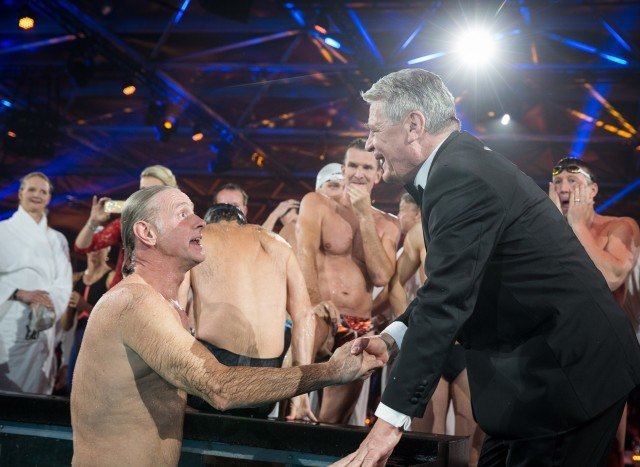
06. Februar 2016, Wiesbaden, Deutschland,Ball des Sports.
In this photo: Roland Matthes, German swimmer with Germany’s Federal President Joachim Gauck
Following his retirement from the sport, Roland elected not to “cash in” or benefit from his reputation, instead devoting himself to a service of others as an orthopedic surgeon. Like my other Olympic hero, the speed-skater, Eric Heiden, who won five individual gold medals at the 1980 Lake Placid Olympic Winter Games and shortly afterwards became an accomplished doctor, both these great Olympians never rested on their laurels, but continued to grow and challenge themselves. And both worked incognito as their national team doctors for the next generation of Olympic hopefuls.
As the 2016 Olympic Games were about to begin in Rio De Janeiro, I received an email from Daniela Matthes, his wife. She and Roland were coming to Los Angeles on vacation, and Daniela wanted to surprise her husband with a get-together. I jumped at the chance, and we nostalgically planned to go swimming in a nearby Olympic sized pool. In Pasadena, he looked the same as I remembered, stylish, handsome, humble and graceful in the pool. He had the same elegant mastery of his stroke, and his kick was still powerful, though he politely refused the opportunity to race. He had nothing to prove. His wife was his interpreter, though I could tell that Roland understood much of what was being said. He smiled at my jokes and nodded frequently, often with a thumbs-up sign. Dani was a charmer, herself a competitive fencer and a friendly and outgoing extrovert. She was the perfect vehicle to bring him out of his shell.
Afterwards, we found ourselves on my living room couch, watching the Olympic swimming finals on television. Backstroke rules have changed a lot since the 1970s. Backstrokers now benefit from freestyle flip-turns and plastic wedges lowered into the pool to secure their feet for the slippery starts. Roland said he no longer followed the sport very much, so when I asked his opinion of the wedges, in his German accent, he said simply, “What will they do next? Give them all fins?” We laughed out loud, two old swimmers remembering our days of glory.
Though I was able to revisit Roland and Dani in Europe a year later, I consider that time on my couch as one of my most precious swimming experiences. The man who molded my career, the man I did not merely want to emulate but wanted to be, had become a dear friend, and in spite of our language and geographical and political distance, he was considering us as equals.
Roland passed away this week, far too soon, and I can’t help thinking that some swimmers may eventually match his records, but no one will ever take his place.
My sincere sympathies go to Dani and my thanks for the fact that she brought us together one more time.
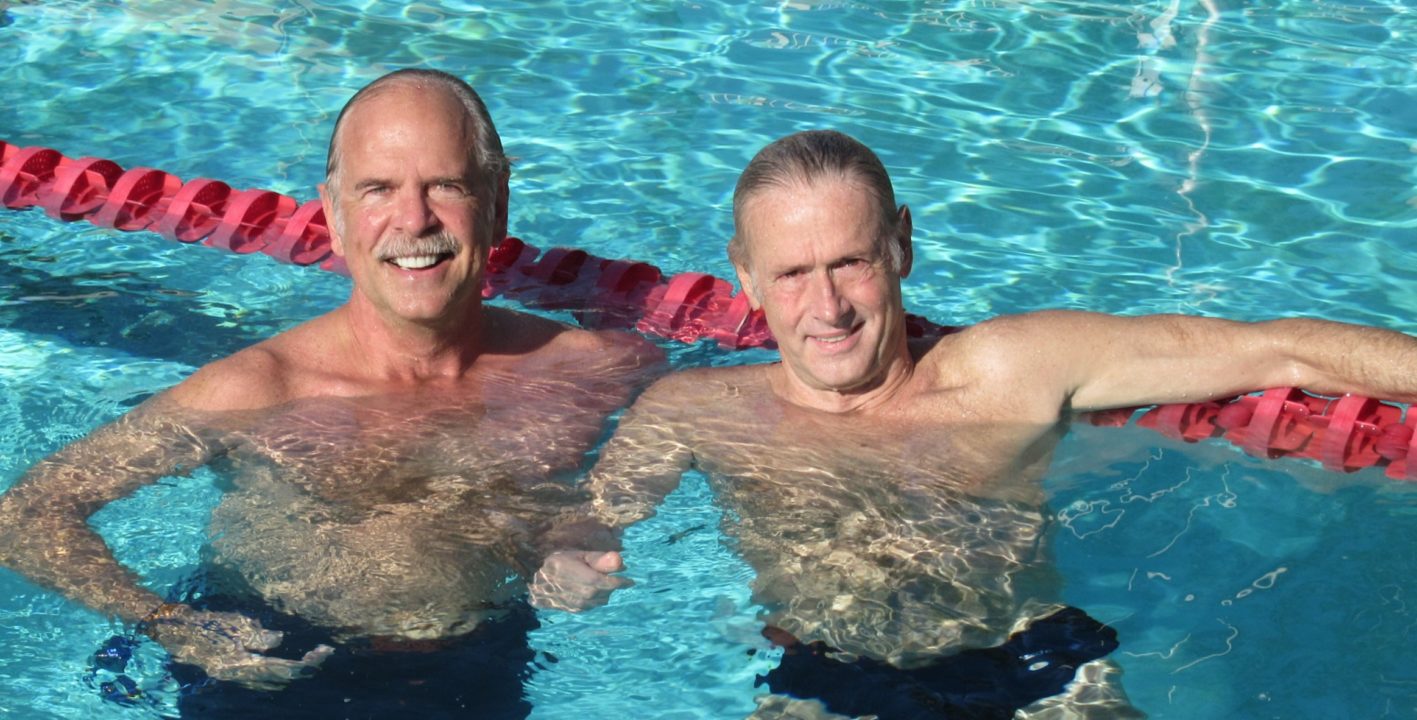
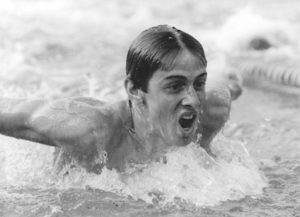
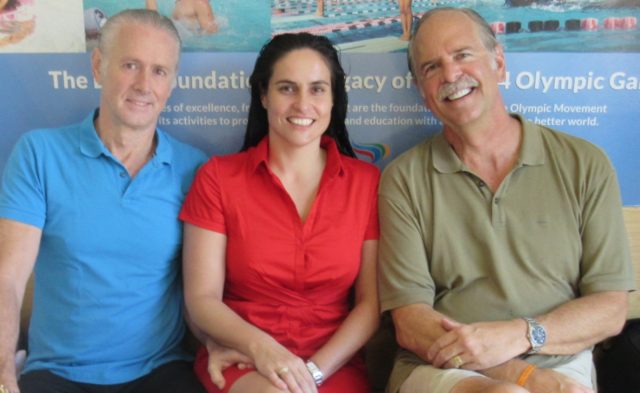
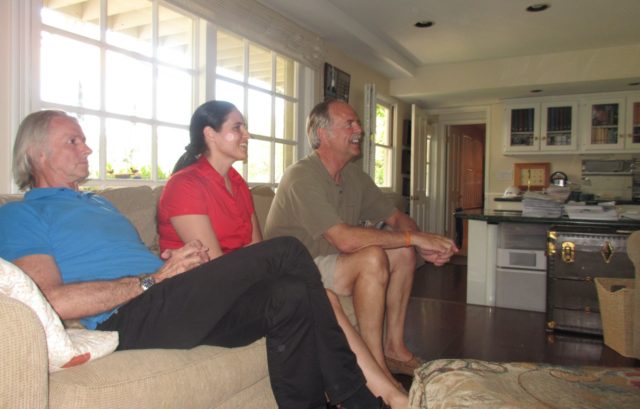
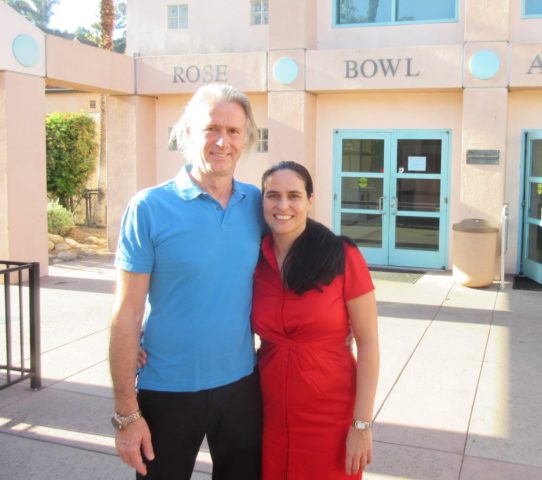
Nice one!
RIP – legend!
This a wonderful tribute to a great man. Thanks for writing this and sharing your personal experiences with Mr Matthes.
Great post filled with inside info! PLEASE SwimSwam post more like this Tank you John Naber for presenting this message.
God bless you for sharing John. Growing up a backstroker in that era, I am deeply touched by your perspective and reflections. Thank you.
I know “Thanks for sharing” is a cliche, but that’s one of the best first-person swimming stories I’ve ever read.
Great article, thank you John & also SwimSwam for publishing it. For those who don’t know or remember, before Rowdy, there was John Naber as the color commentator for all major swimming events for US-based network television. I always enjoyed his smooth delivery & insights. Loved his line “I can’t help thinking that some swimmers may eventually match his records, but no one will ever take his place.” Further, besides being the
Apologies, was cut off during an edit: continuing after …”take his place”: Further, a little bit about John courtesy of http://www.sports-reference.com website: “With four gold medals, all in world-record time, and one silver, John Naber was the outstanding swimmer of the [1976] Montreal Olympics. His record at every other major championship was equally impressive. At the NCAAs, Naber won 10 individual and five relay titles and at the AAUs, he won 18 individual and seven relay titles. He won three golds at the 1977 Pan-American Games and ran up a fine record as a “barrier breaker” in the backstroke. Naber was the first man to beat 50 seconds for 100y, the first under 56… Read more »
He was also known to ham it up before races, well before Gary Hall, Jr. and the rest. I love this quote from another great backstroker, Bruce Hardcastle. “John is always so friendly, and that makes it hard to swim against him,” Hardcastle complains. “I sometimes think he does it for a purpose. Like before a race he’ll say, ‘Let’s you and I go one-two.’ I know he means I’m the one finishing second. That’s when I tell myself, ‘Hey, maybe this guy’s not that nice.’ “
Beautiful tribute.